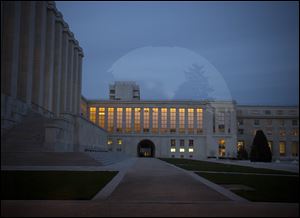
Syrian negotiators observe minute of silence in rare moment of unity
1/30/2014
The floor of the building where the Syrian peace talks take part is illuminated at the United Nations headquarters in Geneva, Switzerland, with a reflection of the garden in a window.
GENEVA — Syrian negotiators observed a minute of silence Thursday to honor the tens of thousands of people who have died in their country’s civil war — a rare moment of unity in talks marked by divisions and bitterness.
U.N. mediator Lakhdar Brahimi said the opposition delegation made the suggestion and the government negotiators agreed, as the talks neared the end of their first phase.
The observation was one of the few ice breaking moments that have occurred during the peace talks, which have been stained over issues such as the opposition’s demand for a transfer of power in Syria.
The negotiations — aimed at ending the three-year civil war that has killed more than 130,000 people — will end Friday and likely be followed by a weeklong break.
“We had tense moments and also rather promising moments,” Brahimi said. “I hope that we will try a little bit to draw some lessons about what we did and see if we can organize ourselves better for the next session.”
But Brahimi also said he was “very disappointed” that the humanitarian aid effort to get food convoys into besieged parts of the central Syrian city of Homs had stalled. Negotiations are still under way about whether to allow people to evacuate the area beforehand.
Syrian authorities said they wanted guarantees that the aid would not reach “terrorists” and gunmen in the city.
However, the U.N. delivered hundreds of relief parcels Thursday to the besieged rebel-held Palestinian Yarmouk camp in the Syrian capital, United Nations and Palestinian officials said. The camp is one of the hardest-hit opposition enclaves under tight blockades imposed by pro-government forces.
In Geneva, the government and opposition representatives continued to blame each other for the violence in Syria.
Louay Safi, a spokesman for the opposition’s negotiating team, said his delegation presented evidence about “the massacres committed by the regime throughout the region.” He told journalists the only way to stop the violence is to form a transitional governing body.
But he complained that the government’s interpretation of the 2012 Geneva Communique, a transitional roadmap agreed on by world powers during an earlier round of Syrian peace talks, would “leave the formation of the governing body to the end.”
Safi said a transitional governing body would “provide the mechanism to implement all the points” of the communique.
Syrian Deputy Foreign Minister Faisal al-Mikdad said of the opposition that “it’s very clear they committed a lot of massacres.”
“Their rejection of discussing the issue of terrorism and finalizing or coming out with a statement is a scandalous one,” he said. “They support all terrorist organizations. They claim to be fighting terrorism while they are conniving with terrorism to kill the Syrian people.”
What began in Syria as a largely peaceful uprising for freedom and rights in March 2011 deepened the country’s sectarian divide and morphed into a full-blown civil war, making it a difficult proposition to form a transitional government.
President Bashar Assad’s family, from Syria’s Alawite minority, has ruled the country since 1970, but other religious minorities have been pulled into its political orbit while rebellions by members of the Sunni majority were crushed.
One obstacle for the Geneva talks is that the opposition delegation does not control armed groups inside Syria, including al-Qaida-backed militants, who do not feel bound by agreements reached in the talks.